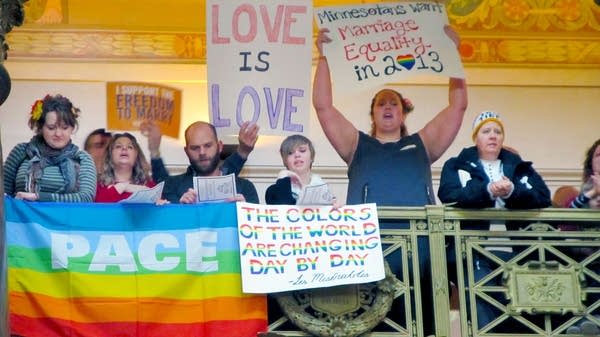From 'Vote No' to voting yes on same-sex marriage in Minnesota
Go Deeper.
Create an account or log in to save stories.
Like this?
Thanks for liking this story! We have added it to a list of your favorite stories.

Today on the MPR News Update: Hearings open on same-sex marriage at the Capitol, the Ojibwe take ownership of two St. Paul hotels, more TurboTax problems, worries about pollution from triclosan and nanoparticles, and more.
SAME-SEX MARRIAGE: Committees in the House and Senate are holding hearings today on a bill that would legalize same-sex marriage in Minnesota. Advocates on both sides are focusing much of their attention on newly elected Democrats from rural Minnesota whose constituents largely favored last fall's failed constitutional amendment to make marriage only between men and women.
TRICLOSAN BAN: A state Senate panel on Tuesday will consider making Minnesota the first state to ban triclosan, a common ingredient in antibacterial soap. Environmental groups are concerned about triclosan and its byproducts, which include a dioxin, building up in the environment and causing potential health problems. Various dioxins have been associated with birth defects, allergy sensitivity and cancer.
METHADONE REGULATION: A bill that would further regulate methadone treatment clinics in Minnesota was approved by a Senate committee following a hearing Monday night. Methadone is used as a pain killer, but is to treat addictions for opiate drugs like heroin. The bill would make the state's Department of Human Services the primary regulator for the clinics by brining state regulations in line with federal standards.
Turn Up Your Support
MPR News helps you turn down the noise and build shared understanding. Turn up your support for this public resource and keep trusted journalism accessible to all.
NANOPARTICLES: Concerned about a potential environmental hazard
TURBOTAX: The Minnesota Department of Revenue says errors in Intuit's TurboTax software are much more extensive than initially believed. At first, the department thought the problem might be limited to a section of the state tax return that does not affect a filer's tax obligation. But now the revenue department says TurboTax's professional and consumer software has about a dozen problems, some of which could affect a tax bill or refund.
ROCHESTER: The city of Rochester has become a recent focal point politically, and economically, for the state of Minnesota. First there was the news from Mayo Clinic of a big investment proposal to reinvigorate Rochester as a global medical destination. Then came last week's news IBM is moving most of its production, and an untold number of jobs, out of the Rochester area. Yesterday, All Things Considered talked with Rochester mayor Ardell Brede, who was in Washington for the National League of Cities' conference.
UNITEDHEALTH SUIT: A group representing psychiatrists in New York State is suing Minnetonka-based UnitedHealth Group for violating laws requiring parity in mental health coverage. The complaint filed in New York federal court accuses the giant health insurer of limiting, delaying and denying mental health treatment.
OJIBWE-OWNED HOTELS: The Mille Lacs Band of Ojibwe has officially closed on the purchase of the Crowne Plaza and DoubleTree hotels in downtown St. Paul. Now, they want the two hotels to become the cornerstones of a nationwide tribal hospitality empire that could stretch from coast to coast. "This investment really represents a diversification for the band beyond gaming," said Joe Nayquonabe, CEO of the band's business development arm. "We're really excited about creating new revenue streams for the band. That's really what this investment is all about."
MINNEAPOLIS RAPES: The relatively high rate of reported in Minneapolis compared to other major cities is due to a broader definition of assaults, according to police. In 2011, Minneapolis had the highest rate of rape -- 100 incidents per 100,000 people - of any other major city in the U.S., according to the FBI's Uniform Crime Statistics. But a police spokesman says the department includes criteria for rape that other cities do not, and follows a definition of rape that is broader than the one used by the FBI.
SLEEP AND WEIGHT GAIN: Tired? Surely those cookies will help ... and a burger ... chips ... and a cupcake ... soda, too. People do eat more when they're short of sleep. And that impulse to snarf when sleepy can cause quick weight gain, according to a new study. Since Americans are chronically sleep deprived, it's no wonder that our waistlines have been expanding.



